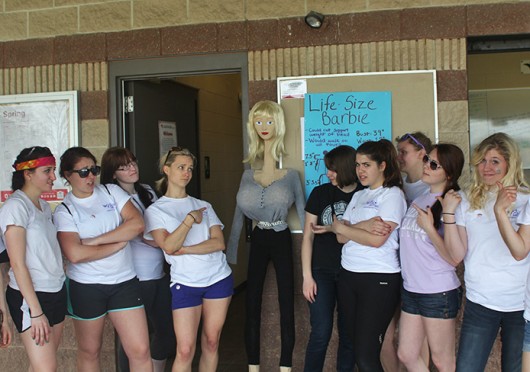
Members of the OSU Body Sense club pose for a photo with a representation of a life-sized Barbie.
Credit: Francis Pellicciaro / Lantern reporter
Some members of the Ohio State community banded together this week to bring awareness to an issue that affects roughly 30 million people in the U.S. each year.
According to the National Eating Disorders Association, about 20 million women and 10 million men in the U.S. suffer from eating disorders at some point in their lives, however many struggle to receive the health care and support they need to get better.
“Poor access to specialized providers and inadequate insurance coverage are two often limiting factors along the road to recovery (from eating disorders),” said Leisel Willis, a registered nurse and outreach coordinator at the Center for Balanced Living in Worthington, Ohio.
Willis spoke before the fourth annual Columbus NEDA Walk Sunday to a crowd of about 200 people at OSU’s Fred Beekman Park, drawing on her experience both as a health care professional and as someone recovering from anorexia nervosa.
OSU student organization Body Sense, which advocates for positive body image and aims to fight the causes of negative body image, hosted the event, which surpassed its fundraising goal of $10,000 by amassing more than $10,860.
Becky Rance, of Columbiana, Ohio, said she drove in to join her daughter, Logan Rance, a second-year in biology and the incoming secretary of Body Sense, at Sunday’s walk to show solidarity because she and her daughter have both struggled with eating disorders.
“My worst fear was that she would have the same experience as me. When it happened to her, I was scared to death … because she didn’t know anything,” Becky Rance said, explaining her own battle with bulimia nervosa and her daughter’s fight against both anorexia nervosa and a less clearly defined condition called “eating disorder not otherwise specified.”
“Treatment is very expensive and not covered by insurance. Worth every penny though,” Becky Rance said.
Logan Rance said she gravitated to the student group as a way to get involved and find “a community of like-minded people” after transferring from Kent State before Fall Semester.
“(Body Sense) doesn’t just focus on eating disorders, but on body image, positivity and loving yourself how you are. I’ve struggled with it a little bit,” Logan Rance said. “It’s important for people to realize it’s an isolating experience.”
The annual walk is one of many across the country that NEDA sponsors through the efforts of local organizations like Body Sense to foster discussion and increase cognizance of the seriousness of eating disorders as an enduring and serious medical problem.
“That’s the goal of the group. You can’t change anything if you’re silent,” said Kelsi Schwall, a 2012 OSU alumna and current OSU occupational therapy graduate student who founded Body Sense at the end of her freshman year and was this year’s Columbus NEDA Walk coordinator.
Schwall said she dealt with bulimia nervosa in high school and anorexia nervosa in college and explained that NEDA walks are designed to not only raise money but also to educate people about eating disorders and their diagnosis and treatment.
“You’re two pounds above what would be considered anorexia, or ‘I’m only throwing up once a week,’ so you’re not sick enough or not thin enough (to medically qualify for treatment),” Schwall said. “How is that not sick? I was absolutely sick. Technically, you have to have amenorrhea (absence of menstruation before menopause) to have anorexia. So by that definition, how could a man have it? It’s such screwed up thinking.”
Willis said the help that is offered to people with eating disorders is limited.
“(With) devastating frequency, too often the care we deliver is shaped not solely by our perception of a client’s need but also by the limitations of services approved, based on insurance’s determination of ‘sick enough,’” Willis said.
Body Sense president Autumn Blatt, a fourth-year in psychology, said she was pleased with the turnout Sunday.
“I’m in recovery myself after seven years of struggling with anorexia nervosa and I can say today that the life that I live is nothing I might have envisioned for myself a few years back,” Willis said, adding that she had spent 48 total weeks in five trips to inpatient treatment. “And that’s why I commit everyday to challenging my own recovery to help support others find theirs.”


